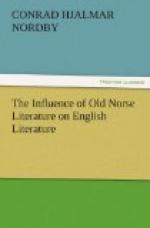The saga and the poem tell the story of two neighboring farms, Herdholt and Bathsted, whose sons and daughters work out a dire tragedy. Kiartan and Bodli are the son and foster-son of the first house, and Gudrun is the daughter of the second. These are the principal personages in the drama, though the list of the other dramatis personae is a long one. Not only in the name of its heroine does the story suggest the Nibelungenlied. The machinery of the Norse stories resembles the German story’s in many of its parts. In this version of Morris, the main features of the saga are kept, and distracting details are properly subordinated to the principal interest. Through the nineteen divisions of this story the interest moves rapidly, and wonder as to the issue is never lost. As a story-teller, Morris is distinctly powerful in this poem, and all the qualities that endear the story-teller to us are here found joined to many that make the poet a favorite with us. There are no lyrics in the poem—the original saga was without the song-snatches that are often found in sagas—but there are dramatic scenes that recall the power of the Master-poet. Least of all the poems in the Earthly Paradise does “The Lovers of Gudrun” show the Chaucerian influence, and the reader must be captious indeed who complains of the length of this story.
To the unenlightened reader this poem reveals no traits that are un-English. What there is of Old Norse flavor here is purely spiritual. The original story being in prose, no attempt could be made to keep original characteristics in verse-form. So “The Lovers of Gudrun” can stand on its own merits as an English poem; no excuses need be made for it on the plea that it is a translation.
Local color is not laid on the canvas after the figures have been painted, but all the tints in the persons and the things are grandly Norse. This story is a true romance, in that the scene is far removed from the present day, and the atmosphere is very different from our own. This story is a true picture of life, in that it sets forth the doings of men and women in the power of the master passion. And so for the purposes of literature this poem is not Norse, or rather, it is more than Norse, it is universal. Now and then, to be sure, the displaced Norse ideals are set forth in the poem, but in such wise that we almost regret that the old order has passed away. The Wanderer who tells the tale assures his listeners of the truth of it in these last words of the interlude between “The Story of Rhodope” and “The Lovers of Gudrun”:
Know
withal that we
Have ever deemed this tale
as true to be,
As though those very Dwellers
in Laxdale,
Risen from the dead had told
us their own tale;
Who for the rest while yet
they dwelt on earth
Wearied no God with prayers
for more of mirth
Than dying men have; nor were
ill-content




